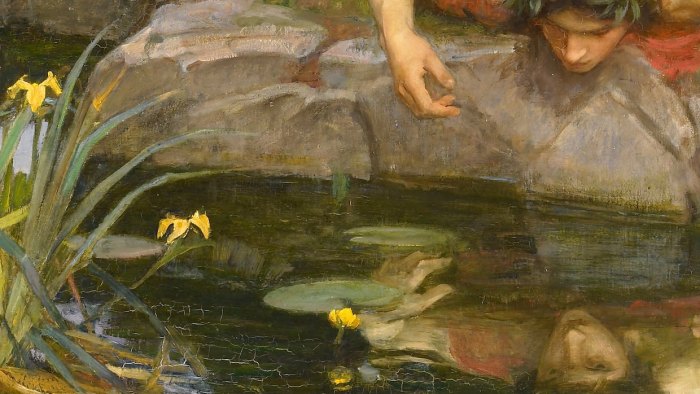Embark on a captivating journey with the echo and narcissus answer key, where we unravel the depths of a timeless myth that continues to resonate with our collective human experience. From its origins in ancient Greece to its profound implications in modern psychology, this exploration delves into the intricacies of Echo and Narcissus, offering insights into the nature of love, identity, and the complexities of the human psyche.
Our exploration unravels the symbolic meanings embedded within the myth, analyzing the psychological implications and how it reflects our own human nature and relationships. We trace the cultural impact of Echo and Narcissus, examining its influence on literature, art, and music throughout history, and discuss its contemporary relevance in our modern world.
Summary of Echo and Narcissus
The myth of Echo and Narcissus is a tragic tale of unrequited love and vanity. It tells the story of Echo, a mountain nymph who was cursed to only be able to repeat the last words spoken to her, and Narcissus, a handsome young man who was so enamored with his own reflection that he refused the affections of others.
When Narcissus first encountered Echo, he was immediately smitten with her beauty. However, Echo was unable to express her own feelings due to her curse. Frustrated by her inability to communicate, Narcissus grew angry and rejected her. Echo was heartbroken and wandered the mountains, eventually fading away until only her voice remained.
Meanwhile, Narcissus continued to gaze at his reflection in a pool of water. He became so obsessed with his own beauty that he forgot to eat or drink. Eventually, he died of starvation, and his body was transformed into the flower that bears his name.
Moral of the Story
The myth of Echo and Narcissus teaches us the dangers of vanity and the importance of loving others. It also reminds us that true beauty comes from within, not from external appearances.
Symbolism and Interpretation: Echo And Narcissus Answer Key
The myth of Echo and Narcissus is rich in symbolism and offers profound insights into human nature and relationships.
Echo represents the unrequited love, longing, and desire for recognition. Her inability to speak independently symbolizes the frustration of not being heard or acknowledged.
Psychological Implications, Echo and narcissus answer key
The myth explores the psychological implications of self-obsession and vanity. Narcissus’s excessive love for his own reflection represents the dangers of excessive self-admiration and the inability to see beyond oneself.
Echo’s fate serves as a cautionary tale about the consequences of neglecting relationships and the importance of valuing the love and support of others.
Reflection of Human Nature
The myth reflects the human tendency to be drawn to superficial beauty and to neglect the inner qualities of others.
It also highlights the importance of self-awareness, self-reflection, and the ability to recognize one’s own flaws and limitations.
Cultural Impact

The myth of Echo and Narcissus has profoundly influenced Western literature, art, and music, inspiring countless works that explore the themes of love, beauty, and self-obsession.
In Greek mythology, Echo’s unrequited love for Narcissus turned her into a mere echo of herself. Similarly, our curiosity about the world often leads us to unexpected discoveries, like the question of whether do praying mantises eat ticks . These fascinating insects may hold the key to controlling tick populations, just as Echo’s love for Narcissus, though unfulfilled, became a part of the natural world.
In literature, the myth has been reinterpreted in various ways. Ovid’s original telling has been adapted into plays, poems, and novels. For example, Shakespeare’s play “Narcissus” and Oscar Wilde’s short story “The Picture of Dorian Gray” both draw on the myth’s themes.
Art
In art, the myth has been depicted in paintings, sculptures, and other visual media. Famous works include Caravaggio’s “Narcissus” and John William Waterhouse’s “Echo and Narcissus.” These artworks often explore the psychological and emotional aspects of the myth, depicting Narcissus’s vanity and Echo’s unrequited love.
Music
In music, the myth has inspired compositions by composers such as Igor Stravinsky and Maurice Ravel. Stravinsky’s ballet “Orpheus and Eurydice” includes a scene based on the Echo and Narcissus myth, while Ravel’s “Ma Mère l’Oye” features a movement titled “Echo et Narcisse.”
Contemporary Relevance
The myth of Echo and Narcissus remains relevant in contemporary culture, as it continues to resonate with audiences through its timeless themes. The story’s exploration of self-love, obsession, and the dangers of vanity has particular relevance in today’s social media-driven society, where individuals often prioritize self-image and seek external validation.
Echo in Literature

Echo, the nymph cursed with only being able to repeat the last words she hears, has become a recurring character in literature. Her story has inspired countless adaptations, each exploring different aspects of her tragic tale.In works such as Ovid’s Metamorphoses and Pausanias’ Description of Greece, Echo serves as a cautionary figure, representing the dangers of unrequited love and excessive pride.
Her inability to express her own thoughts and feelings ultimately leads to her demise, underscoring the importance of self-expression and genuine communication.
Echo in Modern Literature
In modern literature, Echo has taken on a more nuanced and complex characterization. In T.S. Eliot’s “The Waste Land,” she appears as a fragmented and haunting voice, symbolizing the fractured and alienated nature of modern society. Sylvia Plath’s poem “Echo” portrays her as a victim of male domination, her voice reduced to a mere echo of her lover’s desires.
Narcissism in Psychology

Narcissism is a personality disorder characterized by an inflated sense of self-importance, a need for admiration, and a lack of empathy for others. People with narcissism are often grandiose, arrogant, and entitled. They may also be manipulative and exploitative, and they may have difficulty forming meaningful relationships.
The myth of Narcissus is a cautionary tale about the dangers of narcissism. Narcissus was a beautiful young man who fell in love with his own reflection. He became so obsessed with his own beauty that he neglected everything else in his life.
Eventually, he died of starvation, still gazing at his own reflection in a pool of water.
The myth of Narcissus has been used by psychologists to explain the psychological concept of narcissism. People with narcissism are often said to be “in love with themselves.” They may be preoccupied with their own appearance, their accomplishments, and their social status.
They may also be hypersensitive to criticism and may react with anger or rage when their self-esteem is threatened.
Prevalence and Impact of Narcissism in Modern Society
Narcissism is a relatively common personality disorder. It is estimated that about 1% of the population meets the criteria for narcissistic personality disorder. However, narcissistic traits are much more common. It is estimated that up to 15% of the population has some narcissistic traits.
Narcissism can have a negative impact on individuals and society as a whole. People with narcissism are more likely to experience mental health problems, such as depression and anxiety. They are also more likely to engage in risky behaviors, such as substance abuse and gambling.
Narcissism can also damage relationships and make it difficult to succeed in school or at work.
In recent years, there has been a growing concern about the rise of narcissism in modern society. Some experts believe that the rise of social media and the cult of celebrity have contributed to an increase in narcissistic behavior. Whatever the cause, narcissism is a serious problem that can have a negative impact on individuals and society as a whole.
FAQ Overview
What is the main lesson or moral of the Echo and Narcissus myth?
The myth teaches us about the dangers of excessive self-love and vanity, as well as the importance of empathy and compassion.
How does the myth of Echo and Narcissus relate to modern psychology?
The myth has been used by psychologists to understand the concept of narcissism, a personality disorder characterized by an inflated sense of self-importance and a lack of empathy.
What are some examples of how the Echo and Narcissus myth has been reinterpreted in different cultural contexts?
The myth has been reinterpreted in various ways, including in literature, art, and music. For example, the myth has been used to explore themes of love, loss, and identity.